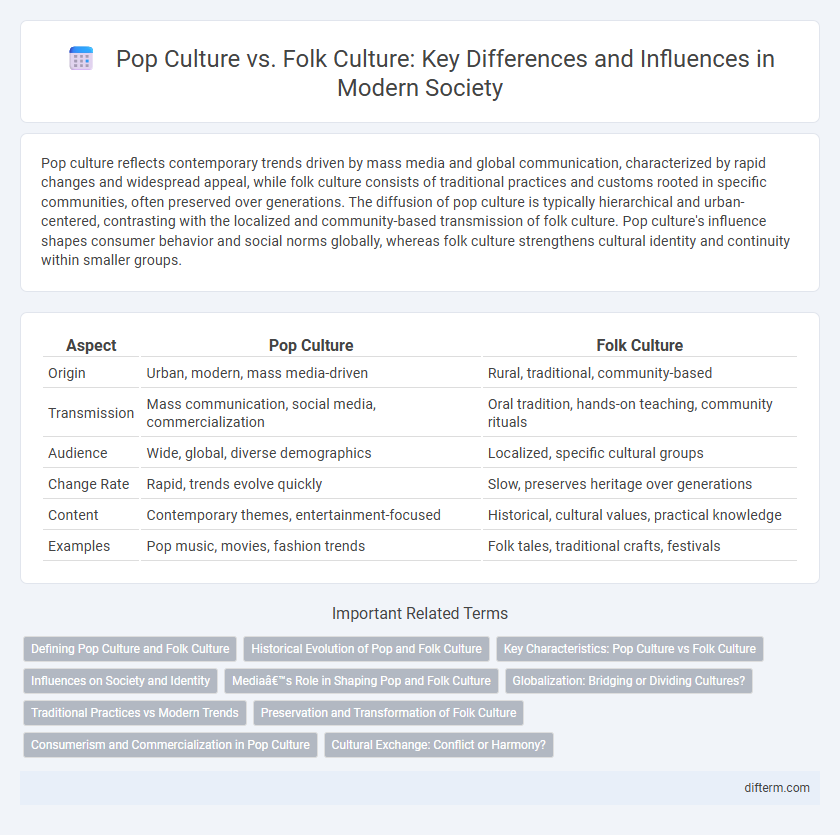Pop culture reflects contemporary trends driven by mass media and global communication, characterized by rapid changes and widespread appeal, while folk culture consists of traditional practices and customs rooted in specific communities, often preserved over generations. The diffusion of pop culture is typically hierarchical and urban-centered, contrasting with the localized and community-based transmission of folk culture. Pop culture's influence shapes consumer behavior and social norms globally, whereas folk culture strengthens cultural identity and continuity within smaller groups.
Table of Comparison
| Aspect | Pop Culture | Folk Culture |
|---|---|---|
| Origin | Urban, modern, mass media-driven | Rural, traditional, community-based |
| Transmission | Mass communication, social media, commercialization | Oral tradition, hands-on teaching, community rituals |
| Audience | Wide, global, diverse demographics | Localized, specific cultural groups |
| Change Rate | Rapid, trends evolve quickly | Slow, preserves heritage over generations |
| Content | Contemporary themes, entertainment-focused | Historical, cultural values, practical knowledge |
| Examples | Pop music, movies, fashion trends | Folk tales, traditional crafts, festivals |
Defining Pop Culture and Folk Culture
Pop culture encompasses mainstream trends, entertainment, fashion, and technology widely embraced by large, heterogeneous societies, often driven by mass media and commercial industries. Folk culture consists of traditional practices, customs, languages, and arts preserved by small, homogeneous groups, typically tied to specific geographic regions and passed down through generations. The distinction lies in pop culture's dynamic, global reach versus folk culture's localized, historical continuity.
Historical Evolution of Pop and Folk Culture
Pop culture emerged prominently during the 20th century, driven by mass media, industrialization, and globalization, reflecting fast-changing trends and urban lifestyles. Folk culture, rooted in localized, traditional practices, has evolved slowly over centuries, preserving communal values, rituals, and crafts passed down through generations. The historical evolution of both cultures highlights a shift from communal, agrarian societies to interconnected, media-driven populations shaping contemporary cultural expressions.
Key Characteristics: Pop Culture vs Folk Culture
Pop culture is characterized by widespread, rapidly changing trends driven by mass media, commercial entertainment, and urban influences, often reflecting contemporary lifestyles and global connectivity. Folk culture, on the other hand, is rooted in tradition, localized customs, and communal practices passed down through generations, emphasizing regional identity and stability in cultural expressions. Key characteristics of pop culture include mass production and consumption, while folk culture highlights handmade crafts and oral storytelling within close-knit communities.
Influences on Society and Identity
Pop culture shapes society by reflecting and amplifying contemporary trends through mass media, creating a shared identity among diverse groups. Folk culture preserves traditional values and customs, reinforcing local identity and community cohesion through generational transmission. The dynamic interaction between pop culture and folk culture influences societal norms, identity formation, and cultural continuity.
Media’s Role in Shaping Pop and Folk Culture
Media plays a critical role in shaping pop culture by rapidly disseminating trends, music, fashion, and slang through television, social media, and streaming platforms, creating widespread and timely cultural phenomena. In contrast, folk culture is preserved and transmitted more slowly through oral traditions, storytelling, and community rituals, with limited media influence primarily focused on documentation and cultural preservation. The divergent impact of media on pop and folk cultures highlights its power in driving global connectivity while simultaneously posing challenges to the survival of localized, traditional practices.
Globalization: Bridging or Dividing Cultures?
Globalization accelerates the spread of pop culture, creating shared experiences across diverse societies, while often overshadowing localized folk cultures and traditions. The pervasive influence of global media and entertainment industries can lead to cultural homogenization, challenging the preservation of unique folk identities. However, globalization also facilitates cross-cultural exchanges, enabling folk culture to gain international recognition and adapt within a broader cultural dialogue.
Traditional Practices vs Modern Trends
Traditional practices in folk culture emphasize community rituals, oral storytelling, and handcrafted artifacts that preserve historical identity across generations. Pop culture, driven by modern trends, rapidly evolves through mass media, digital platforms, and globalized entertainment, often prioritizing innovation and widespread appeal. The contrast highlights folk culture's role in maintaining heritage while pop culture reflects contemporary societal changes and technological influences.
Preservation and Transformation of Folk Culture
Folk culture, deeply rooted in local traditions and community identity, faces challenges in preservation due to globalization and the dominance of pop culture influenced by mass media and consumer trends. Efforts to maintain folk culture involve documentation, revitalization of traditional crafts, festivals, and oral storytelling, which help resist cultural homogenization and sustain intangible heritage. Transformation occurs when folk elements are adapted or hybridized within pop culture, creating dynamic cultural expressions that both preserve and evolve traditional practices.
Consumerism and Commercialization in Pop Culture
Pop culture is heavily influenced by consumerism and commercialization, with trends often driven by media industries and advertising targeting mass audiences. This dynamic promotes rapid dissemination of popular products and entertainment, creating a market-focused cultural landscape. In contrast, folk culture tends to resist commercialization, preserving traditional practices and local identities through community engagement rather than mass consumption.
Cultural Exchange: Conflict or Harmony?
Pop culture and folk culture represent distinct expressions of cultural identity, with pop culture often driven by mass media and commercialization, while folk culture reflects traditional, community-based practices. Cultural exchange between the two can lead to creative fusion and mutual enrichment, but also risks cultural appropriation and identity dilution when power imbalances exist. Navigating this dynamic requires respect for authenticity and open dialogue to foster harmony rather than conflict.
Pop culture vs Folk culture Infographic

 difterm.com
difterm.com